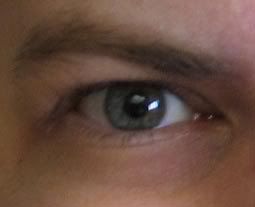Entering Lives and Breaking Hearts
Anthony Minghella returns to London and a smaller character story after a triumphant few years with thunderous (yet still intimate) period near-epics like Cold Mountain, The English Patient and The Talented Mr Ripley.
Breaking and Entering has Jude Law looking, frankly, as fallen and damaged as he ever has. Is he really a heart-throb? Seriously? Okay...but to me he's all inconsistent stubble, strange bone-structure, bulging eyes and receding hairline.
And I mean that in a good way.
Whatever else he is in this movie, he's fully-rounded as a character. Except that the character has an emptiness, a missing part to his life. But you get what I mean. He's not pretty, or especially sexy. But he's human as hell.
Martin Freeman is his best mate. A career path Freeman is undoubtedly going to get landed with after Hitchhikers' Guide failed to take off while The office really did. (He is, for the record, delicious. His comedy is tragic, his tragedy comic. There's a lightness and reality to everything he does.)
So, Law is married to Robin Wright Penn, playing daddy to her mildly autistic teenage daughter. (The kid's great, touchingly layered and far from cliched. Wright Penn does way more with her role, too, than simply be 'the wife'.) Then his workplace, his business, is robbed. Twice.
Law chases the kid responsible back to the home he shares with his mother...and goes about meeting her. Then falling for her.
It's Juliette Binoche. How could he not?
There follows some who-will-cross-who plotting, a little bit of forward movement, but really just enough to keep us going. Because what we really have here is a poem on modern city life.
Breaking and Entering is a film that makes your heart just ACHE. Because everything just seems so...hard. While at the same time we seem to tread water, we also seem beset with problems that constantly sabotage our chances to be happy.
I will happily concede to weeping repeatedly. But the kicker is this - I don't entirely know WHY.
In that regard, among others this feels like a cousin to Paul Haggis' Oscar-winner Crash. Again, crime and coincidence tying together lives of ill-ease, and the film asks questions without being able to throw up many answers.
Minghella beautifully balances the cinematic and the regular. This isn't rom-com chocolate-box London, but it DOES find the cinematic within the real - the thief is a street-runner, flipping his way around the city's rooftops. But it's something his mum thinks is cool.
And it's this real-world feel that stops the film from caving in. Every time you see something you KNOW will cause trouble (because you've seen it in a movie), it doesn't, quite. But the stuff you thought would be fine? THAT'S where you need to watch out.
There are great moments of humour, too. As Law begins hanging out in his car, waiting for his offices to be robbed again, he strikes up a bizarre friendship with a local prostitute. She brings him Starbucks, he lets he keep warm.
And yet it's all founded on credibility; and, maybe more importantly, on tonal resonance. Because relationships ARE co-dependant, even the hooker in the passenger seat is showing you a perspective on your life.
Once or twice the subtlety wanders away - usually when Law is given a quick monologue about his character's nature when those thoughts would be better off coming from another character's mouth - but this is just nigglesome.
The performances are great, the writing always good and often excellent (yet it rarely draws attention to itself), the direction near-faultless.
There's no question that this is not feel-good territory (though the film does tie things up more neatly than it probably should). But it is a dim light on a dark corner.
You'll relate. You'll cry. And you'll leave wanting to do...just a little bit better at the whole 'life' thing tomorrow.


0 Comments:
Post a Comment
<< Home